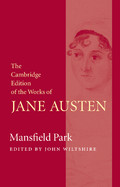Book contents
- Frontmatter
- Contents
- General Editor’s preface
- Acknowledgements
- Chronology
- Introduction
- Note on the text
- Volume I Mansfield Park
- Volume II Mansfield Park
- Volume III Mansfield Park
- Introductory note on Lovers’ Vows
- Lovers’ Vows
- Corrections and emendations to 1816 text
- Appendix: Commentary on the text
- Abbreviations
- Explanatory notes
Appendix: Commentary on the text
Published online by Cambridge University Press: 18 December 2020
- Frontmatter
- Contents
- General Editor’s preface
- Acknowledgements
- Chronology
- Introduction
- Note on the text
- Volume I Mansfield Park
- Volume II Mansfield Park
- Volume III Mansfield Park
- Introductory note on Lovers’ Vows
- Lovers’ Vows
- Corrections and emendations to 1816 text
- Appendix: Commentary on the text
- Abbreviations
- Explanatory notes
Summary
It is likely, as suggested in the Introduction, that many of the variations between 1814 and 1816 are due to the earlier edition being closer to the author's original fair copy. It is also reasonable to argue that many of these would be errors thatAusten would wish to see corrected, and which were corrected in the 1816 text. These traces of the authorial presence would include spellings such as ‘teize’, the frequent capitalisation of such words as ‘Uncle’, ‘Clergyman’ and ‘Navy or Army’ (especially notable in vol. 1, ch. 11), which, on the evidence of her letters and other documents, reflect JaneAusten's MS habits. (Parsonage, however, is sometimes given a capital in 1816, and not in 1814: vol. 2, ch. 2.) They might also include capitalisations after a comma (‘Oh, cousin, If’: vol. 1, ch. 3), (mis)spellings such as ‘tête à téte’ or ‘Lovers Vows’ (‘Lover's vows’ in vol. 2, ch. 3), the failure to register a subjunctive (as soon as the business ‘was arranged’ in 1814, but ‘were arranged’ in 1816 (vol. 2, ch. 8)), and contractions of verbs (‘whisk’d’: vol. 2, ch. 1). Many parenthetical phrases beginning with a dash are not completed with a dash in 1814.
The numerous missed or inconsistent quotation marks in 1814, or double quotation marks within a speech when single are needed, must have been vexing to the author: these are usually but not infallibly corrected in 1816. This edition uses capitalisationmuch more sparingly, corrects misspellings, and removes traces of contractions. Exclamation marks are supplied in 1816 where the expression definitely calls for them: ‘ “Not at all!”—cried Miss Crawford with alacrity’ (vol. 2, ch. 11). Generally speaking, too, 1816 supplies commas around interpolated or adverbial phrases. In vol. 2, ch. 8, and throughout volume 3, however, some commas present in 1814 are deleted, so that the text reads, for example, ‘Every thing where she now was was in full contrast’ (vol. 3, ch. 8). Colons, often substituted for semi-colons in the 1816 text of volume 1, occur quite often in volume 2 of 1814. This may suggest either that the printer of this volume (Roworth) is here following house style, or alternatively that he is reflecting the fair copy more accurately than the notably careless printer (Sidney) of volumes 1 and 3.
- Type
- Chapter
- Information
- Mansfield Park , pp. 633 - 636Publisher: Cambridge University PressPrint publication year: 2005



